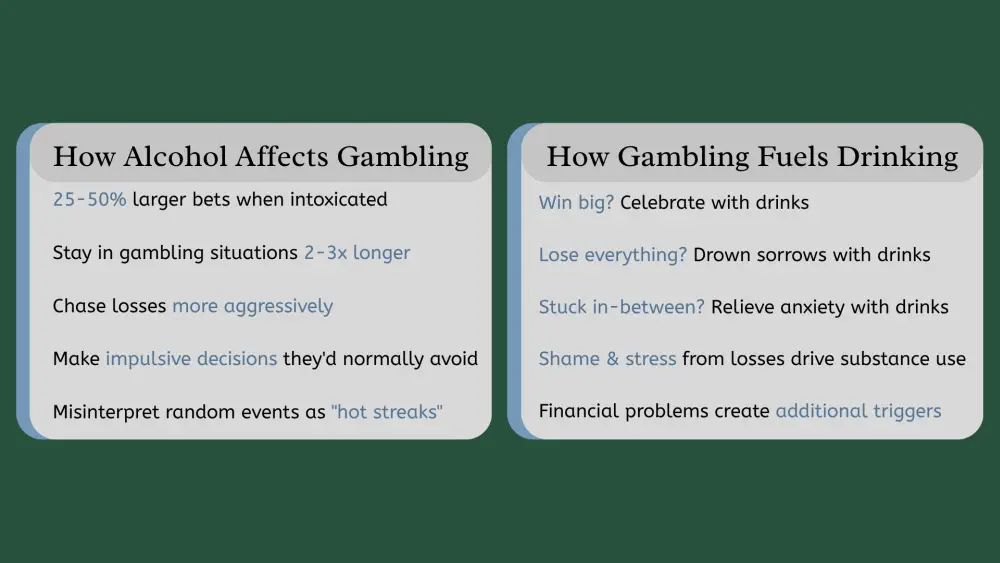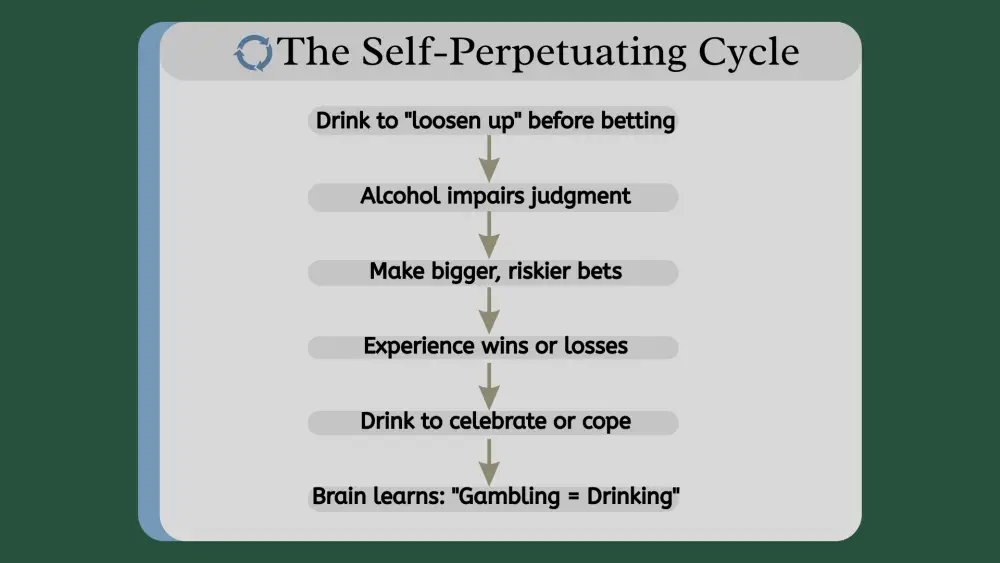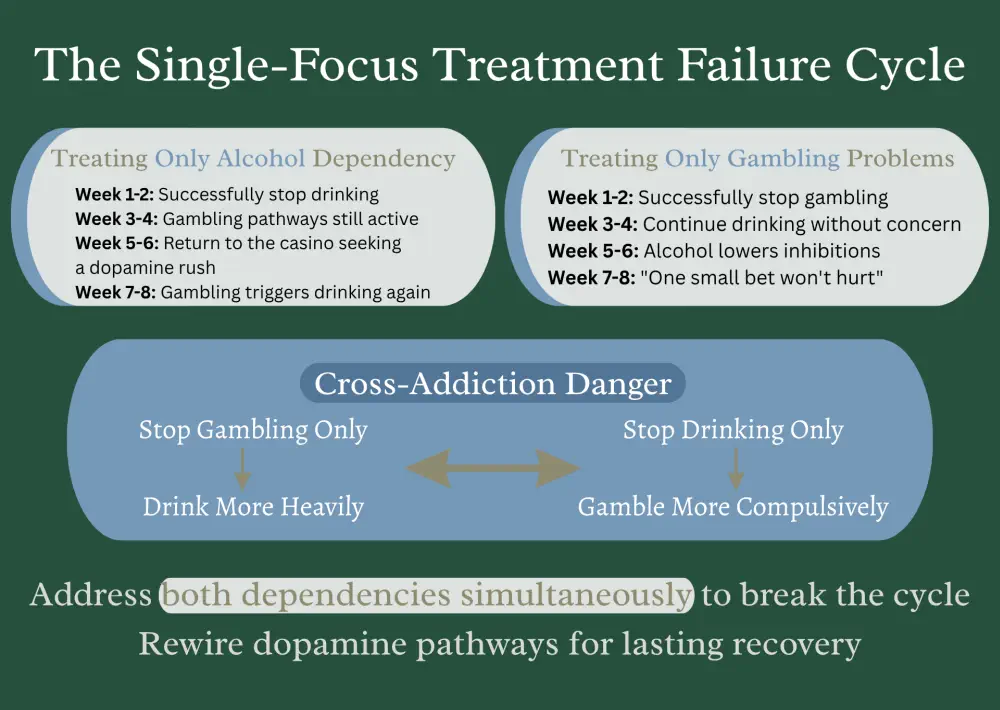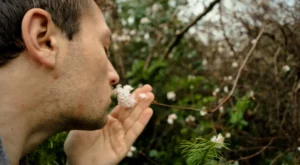We offer medical detox and multiple addiction treatment options in our
luxury treatment centres in Port Hope, Cobourg, and Ottawa.
Why Alcohol and Gambling Often Go Hand in Hand?
Drinking and betting share more than proximity—they feed off each other in ways that trap people in cycles they never saw coming. Research shows that individuals struggling with gambling addiction face three to four times higher risk of developing alcohol use disorders compared to the general population.
The reverse holds equally true. People battling alcoholism often develop problematic gambling behaviours, creating a dual addiction that proves harder to break than either condition alone. Your brain chemistry, decision-making capacity, and reward systems get hijacked from two directions simultaneously.

Key Takeaways:
- Neurological Connection: Alcohol and gambling activate identical brain reward pathways, creating reinforcing cycles where each substance amplifies the other's effects on dopamine production and impulse control.
- Reciprocal Intensification: Drinking impairs judgment and lowers inhibitions during gambling, leading to larger bets and extended sessions, while gambling environments normalize constant alcohol consumption and provide emotional triggers for drinking.
- Treatment Complexity: Standard single-addiction approaches fail with dual dependencies because treating only one condition leaves triggers and neural pathways for the other intact, requiring integrated therapy addressing both simultaneously.
- Recovery Reality: Combined dependencies on betting and drinking demand longer treatment periods (typically 90+ days versus 30-60 for single addictions) but achieve comparable success rates when properly addressed through specialized programs.
How Alcohol and Gambling Create a Dangerous Partnership?
Your brain doesn't distinguish between chemical highs and behavioural rushes the way you might think. Both substance use and compulsive wagering hijack the same neurological reward system, flooding your brain with dopamine—the chemical messenger that screams "this feels good, do it again!"
When you win a bet, dopamine levels surge. When you take that first drink, the same thing happens. Your brain forms powerful associations between these activities and pleasure, creating neural pathways that strengthen with repetition. These pathways don't care about your bank account, your relationships, or your health. They care about that next dopamine hit.
The prefrontal cortex, responsible for impulse control, planning, and rational decision-making, is damaged from both directions. Alcohol directly impairs its function every time you drink. Gambling addiction gradually rewires it to prioritize immediate rewards over long-term consequences. Together, they create a perfect storm of compromised judgment.
Studies published in the Journal of Gambling Studies found that approximately 15% of people with alcoholism also meet criteria for gambling addiction. That's roughly four times the rate seen in the general population. The overlap isn't coincidental—these conditions share genetic vulnerabilities, personality traits like impulsivity and sensation-seeking, and similar patterns of escalation.
Risk-taking behaviours cluster together. Someone drawn to the uncertainty of gambling often displays a similar attraction to alcohol's unpredictable effects. Both activities offer escape from stress, anxiety, or life problems. Both promise control or excitement during moments when life feels uncontrollable or boring.
How Alcohol Intensifies Gambling Addiction (and Vice Versa)?

Alcohol's Impact on Gambling Behaviour
Three drinks in, your brain's ability to calculate odds plummets. That 1% chance of hitting the jackpot? Feels more like 50%. Losses that should trigger your "time to quit" alarm barely register. Your internal warning system goes offline while your risk tolerance climbs.
Alcohol creates a dangerous illusion of confidence. You feel sharper, luckier, more in control—precisely when you're least capable of rational choices. Research from the Centre for Addiction and Mental Health shows that intoxicated gamblers:
- Place bets 25-50% larger than when sober
- Chase losses more aggressively
- Stay in gambling situations 2-3 times longer
- Make impulsive decisions they'd normally avoid
- Misinterpret random events as patterns or "hot streaks"
Casinos and gambling establishments understand this dynamic perfectly. Free drinks aren't generosity—they're strategy. Every complimentary cocktail reduces your ability to walk away from losses while simultaneously increasing the amounts you're willing to risk.
The timing matters too. People often drink specifically to "loosen up" before gambling or to cope with mounting losses. This premeditated pairing strengthens the behavioural link between these activities. Your brain learns: gambling means drinking, drinking means gambling. Breaking one association requires addressing both.
How Gambling Fuels Alcohol Use
Compulsive betting creates emotional volatility that drives people toward alcohol as a coping mechanism. Win big? Celebrate with drinks. Lose everything? Drown sorrows with drinks. Stuck in between? Relieve anxiety with drinks. Every emotional state triggered by wagering becomes a reason to drink.
The shame spiral accelerates both problems. Hiding gambling losses from family creates stress that alcohol temporarily relieves. Drinking to excess causes new problems—missed work, relationship conflicts, health issues—that gambling promises to solve through big wins. Each addiction provides justification for the other.

Financial devastation from gambling and alcohol addiction creates additional drinking triggers. The stress of mounting debt, depleted savings, and collection calls overwhelms your nervous system. Alcohol offers temporary numbness from the consequences that feel too painful to face sober.
Gambling environments normalize constant drinking. Poker nights center around beer. Casino players receive endless cocktails. Sports betting happens in bars surrounded by alcohol. These settings make it nearly impossible to separate the behaviours because the culture explicitly links them together.
The Unique Challenges of Treating Dual Addiction
Why Standard Approaches Fall Short
Traditional addiction treatment typically focuses on a primary substance or behaviour. This single-focus approach collapses when facing combined gambling and alcohol addiction because addressing only one leaves the door wide open for the other to flourish.
Treating alcohol dependency without addressing gambling means your newly sober brain still has those gambling-related dopamine pathways intact and screaming for activation. You might stop drinking, but within weeks, find yourself at the casino trying to recreate that missing rush. The gambling then triggers alcohol use again—you're back where you started.
The reverse proves equally problematic. Stop gambling, but continue drinking, and alcohol's disinhibiting effects will eventually lead you back to placing bets. One drink becomes "just checking the sports scores" becomes "a small bet won't hurt" becomes full relapse into both dependencies.
Cross-addiction (substituting one dependency for another) happens frequently when only one behaviour gets addressed. Your brain's reward system remains dysfunctional. Without compulsive betting to activate it, you might drink more heavily. Without alcohol, you might wager more compulsively. Neither scenario represents real recovery.
Withdrawal timelines differ significantly between substances and behaviours. Alcohol withdrawal involves acute physical symptoms requiring medical supervision. Gambling withdrawal manifests primarily as psychological distress—anxiety, irritability, obsessive thoughts about betting. Treating these overlapping but distinct withdrawal patterns demands specialized knowledge.

What Effective Treatment Looks Like
Successful recovery from combined alcoholism and gambling problems requires integrated treatment addressing both conditions simultaneously. This means working with teams experienced in dual diagnosis who understand how these addictions reinforce each other.
Medical detoxification handles the physical aspects of alcohol withdrawal safely. This typically involves 5-10 days of supervised care where medications manage symptoms like tremors, anxiety, and potential seizures. During this phase, counselling begins addressing the gambling component, even though physical gambling withdrawal isn't medically dangerous.
Cognitive-behavioural therapy helps identify the thoughts and situations triggering both drinking and gambling. You learn to recognize how these behaviours interconnect—which emotional states drive you toward each, how one addiction provides excuses for the other, and strategies for disrupting these patterns.
Treatment programs must extend longer for dual addictions. Where single-addiction recovery might require 30-60 days of intensive work, combined gambling and alcohol addiction typically needs 90+ days. Your brain requires this extended period to rewire reward pathways and establish new coping mechanisms for both behaviours.
Support groups specific to each addiction become crucial. Alcoholics Anonymous addresses drinking patterns, while Gamblers Anonymous tackles betting behaviours. Attending both provides thorough peer support and accountability. Some people also benefit from dual-recovery groups designed specifically for multiple addictions.
Is Recovery Possible?
Yes, recovery is possible—but you need realistic expectations about the path ahead. Combined addictions show success rates comparable to single addictions when properly treated, typically ranging from 40-60% maintaining long-term recovery after completing specialized programs.
These numbers might sound modest, but they represent genuine change. Every person who achieves lasting sobriety from both alcohol and gambling breaks free from patterns that seemed permanent. The Canadian Centre for Addictions reports a 95.6% completion rate for clients who engage fully with their personalized treatment plans, with many maintaining recovery years after program completion.
Several factors predict better outcomes. Early intervention before either addiction progresses to severe stages improves success substantially. Strong family support networks that understand dual addiction challenges provide accountability and encouragement during difficult moments. Co-occurring mental health conditions like depression or anxiety need treatment alongside both addictions—addressing these underlying issues prevents using gambling or alcohol as self-medication.
Relapse doesn't mean failure. Most people experience setbacks during recovery—returning to either gambling or drinking once doesn't erase progress or doom future attempts. Each relapse provides information about triggers and vulnerabilities. Returning to treatment quickly after a slip prevents brief lapses from becoming full-blown relapses into old patterns.

Personalized therapies for drug and behavioural addictions
The Canadian Centre for Addictions offers specialized programs designed specifically for combined substance and behavioural dependencies. Our integrated approach addresses both alcohol dependency and compulsive gambling simultaneously, recognizing that treating only one leaves you vulnerable to relapse.
Recovery from dual addiction can be challenging but possible with support. You don't have to face this alone. Contact us at 1-855-499-9446 to learn about treatment options that address both alcohol and gambling addiction together. Our team understands the unique challenges of co-occurring addictions and can guide you toward lasting recovery and freedom from both behaviours.
FAQ
Why do casinos offer free alcohol?
Casinos provide complimentary drinks because alcohol impairs judgment, increases risk-taking behaviour, and keeps people gambling longer with higher bets. This business model deliberately exploits how alcohol intensifies gambling behaviour, creating an environment where combined addiction thrives.
Can I recover from one addiction while still engaging in the other?
Recovery from only one addiction while continuing the other rarely succeeds long-term. The behaviours reinforce each other neurologically and psychologically. Stopping drinking but continuing to gamble leaves triggers intact that eventually lead back to alcohol use, and vice versa. Effective recovery addresses both simultaneously.
How long does treatment take for combined gambling and alcohol addiction?
Treatment duration varies based on addiction severity, but combined addictions typically require longer programs than single addictions—usually 90+ days versus 30-60 days. Your brain needs this extended time to rewire reward pathways disrupted by both substances and behaviours.
Will I always be at high risk for both addictions?
Risk decreases significantly over time with sustained recovery, but vulnerability never completely disappears. Most people find the first year most challenging, with risk declining substantially after 2-3 years of maintained sobriety from both gambling and drinking. Ongoing support and lifestyle changes maintain long-term recovery.
Does insurance cover treatment for both addictions?
Many Canadian provincial health plans cover portions of addiction treatment, though coverage varies. Private insurance often provides more extensive benefits for dual addiction programs.
Are some people more vulnerable to developing both addictions?
Yes, certain factors increase susceptibility to both gambling and alcohol addiction, including genetic predisposition to addictive behaviours, impulsivity and sensation-seeking personality traits, history of childhood trauma or adverse experiences, and co-occurring mental health conditions like depression or anxiety.
Article sources
- Petry, N.M., et al. (2005). "Comorbidity of DSM-IV pathological gambling and other psychiatric disorders: results from the National Epidemiologic Survey on Alcohol and Related Conditions." Journal of Clinical Psychiatry, 66(5), 564-574. Available at: https://pubmed.ncbi.nlm.nih.gov/15889941/
- Kessler, R.C., et al. (2008). "DSM-IV pathological gambling in the National Comorbidity Survey Replication." Psychological Medicine, 38(9), 1351-1360. Available at: https://www.ncbi.nlm.nih.gov/pmc/articles/PMC2796047/
- Lorains, F.K., Cowlishaw, S., and Thomas, S.A. (2011). "Prevalence of comorbid disorders in problem and pathological gambling: systematic review and meta-analysis of population surveys." Addiction, 106(3), 490-498. Available at: https://pubmed.ncbi.nlm.nih.gov/21210880/
- Cronce, J.M., and Corbin, W.R. (2010). "Effects of alcohol and initial gambling outcomes on within-session gambling behaviour." Experimental and Clinical Psychopharmacology, 18(2), 145-157. Available at: https://pubmed.ncbi.nlm.nih.gov/20384426/
- Ellery, M., Stewart, S.H., and Loba, P. (2005). "Alcohol's effects on video lottery terminal (VLT) play among probable pathological and non-pathological gamblers." Journal of Gambling Studies, 21(3), 299-324. Available at: https://pubmed.ncbi.nlm.nih.gov/16134009/
- Grant, J.E., Chamberlain, S.R., and Schreiber, L. (2012). "Clinical correlates of co-occurring alcohol use disorder and gambling disorder." Journal of Addiction Medicine, 6(3), 214-219. Available at: https://pubmed.ncbi.nlm.nih.gov/22614937/
- Dowling, N.A., et al. (2015). "The prevalence of comorbid personality disorders in treatment-seeking problem gamblers: A systematic review and meta-analysis." Journal of Gambling Studies, 31(2), 515-539. Available at: https://pubmed.ncbi.nlm.nih.gov/24338281/
- Slutske, W.S., et al. (2013). "Genetic and environmental contributions to the comorbidity between alcohol dependence and conduct disorder in adolescence." Psychological Medicine, 43(6), 1269-1280. Available at: https://www.ncbi.nlm.nih.gov/pmc/articles/PMC3578098/
- Stea, J.N., and Hodgins, D.C. (2011). "A critical review of treatment approaches for gambling disorders." Journal of Gambling Studies, 27(3), 411-438. Available at: https://pubmed.ncbi.nlm.nih.gov/20700627/
- Cowlishaw, S., et al. (2012). "Psychological therapies for pathological and problem gambling." Cochrane Database of Systematic Reviews, 11, CD008937. Available at: https://pubmed.ncbi.nlm.nih.gov/23152266/
- Government of Canada. (2024). "Canadian Alcohol and Drugs Survey (CADS): Summary of Results." Health Canada. Available at: https://www.canada.ca/en/health-canada/services/canadian-alcohol-drugs-survey.html






